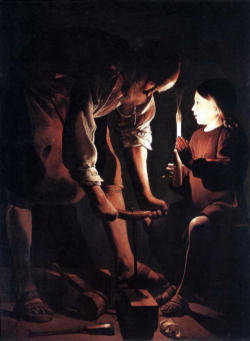 It was Friday morning and life in the domestic church of the Fournier home was progressing in its frenzied but predictable manner. Our four year old grandson Noah and his Mom live with us and he is a joy and light in our home. Our five children are, as is said in modern parlance, “grown up”, but still growing. We all are, aren’t we? That is what life is about. This precious little guy is full of surprises and this morning would prove to be no exception.
It was Friday morning and life in the domestic church of the Fournier home was progressing in its frenzied but predictable manner. Our four year old grandson Noah and his Mom live with us and he is a joy and light in our home. Our five children are, as is said in modern parlance, “grown up”, but still growing. We all are, aren’t we? That is what life is about. This precious little guy is full of surprises and this morning would prove to be no exception.
“TGIF Poppi'” he said with that cute little voice of his. I had to ask him to repeat what he said for two reasons; my hearing is not as good as it once was and I did not really expect him to even know this expression. When he repeated it again with that cute smile that lights up the world, ‘TGIF” he added “that’s what my Mom says”. His mom was upstairs getting ready for work. So, I pressed the little guy to explain the expression to me. He did so matter of factly, “Thank God Its Friday Poppi”.
The moment immediately became a snapshot in this aging mind of mine and brought a much welcome smile to my face. However, it also invited me to reflect again on the meaning of work. I have done so repeatedly in my life. After all, next to sleeping, we spend more time “working” than anything else. It was the Catholic, or classical Christian vision of work which is one of the reasons I am a Catholic by Choice.
During the last years of his service to the Church and the world the Venerable John Paul II addressed leaders of the “Catholic Action” movement in Italy on the Feast of St. Joseph the Worker. He referred to what he called the “gospel of work”. I wrote an article on that address years ago. Sadly, I heard from some Protestant Christians who misunderstood the theme, thinking that the Holy Father was speaking of “works”. Nothing could have been more inaccurate. Rather, he was proclaiming another effect of God’s lavish and amazing grace, that in and through the redemptive work of Jesus Christ all human work has now been transformed.
One of the late Pope’s favorite passages from the Second Vatican Council, the last great Church Council, contains these words: “The truth is that only in the mystery of the incarnate Word does the mystery of man take on light. For Adam, the first man, was a figure of Him Who was to come, namely Christ the Lord. Christ, the final Adam, by the revelation of the mystery of the Father and His love, fully reveals man to man himself and makes his supreme calling clear. It is not surprising, then, that in Him all the aforementioned truths find their root and attain their crown. He who is “the image of the invisible God” (Col. 1:15) is Himself the perfect man.
“To the sons of Adam He restores the divine likeness which had been disfigured from the first sin onward. Since human nature as He assumed it was not annulled, by that very fact it has been raised up to a divine dignity in our respect too. For by His incarnation the Son of God has united Himself in some fashion with every man. He worked with human hands, He thought with a human mind, acted by human choice and loved with a human heart. Born of the Virgin Mary, He has truly been made one of us, like us in all things except sin.” (GS 22)
In proclaiming this “gospel of work” John Paul developed a theme rooted in the Sacred Scriptures and desperately needed in this age, the dignity and meaning of human labor. In 1981 he authored an Encyclical letter entitled “On Human Work” which presents the Christian vision of human work. We live in an age that has lost sight of this Christian vision. This is one more bad fruit of the rupture which was wrought by sin. In the industrial age, men and women were often reduced to mere instruments in a society that emphasized “productivity” over the dignity of the human person, the worker. The technological age promised something different, but has failed to deliver. Too often, men and women are still viewed as instruments and objects rather than persons and gifts. To grasp the truth that dignity of all human labor derives from the dignity of the human person who engages in it requires what St Paul rightly called a “renewal of the mind” (See, Romans 12:2).
Pope John Paul told those assembled that because work “has been profaned by sin and contaminated by egoism,” it is an activity that “needs to be redeemed.” He reminded them that “Jesus was a man of work and that work enabled him to develop his humanity”. He emphasized that “the work of Nazareth constituted for Jesus a way to dedicate himself to the ‘affairs of the Father,'” witnessing that “the work of the Creator is prolonged” through work and that therefore “.according to God’s providential plan, man, by working, realizes his own humanity and that of others: In fact, work ‘forms man and, in a certain sense, creates him..”
He emphasized the need for work to be rescued “from the logic of profit, from the lack of solidarity, from the fever of earning ever more, from the desire to accumulate and consume.” When the focus of work becomes subjected to what he called “inhuman wealth”, he said, it becomes a “seductive and merciless idol.” That rescue occurs when we “return to the austere words of the Divine Master: ‘For what does it profit a man if he gains the whole world and loses or forfeits himself?'” Finally, John paul explained that Jesus, The “divine Worker of Nazareth” also “reminds us that ‘life is more than food’ and that work is for man, not man for work. What makes a life great is not the entity of gain, nor the type of profession, or the level of the career. Man is worth infinitely more than the goods he produces or possesses.”
This “gospel of work” needs to be heard by all who bear the name Christian. The Catechism of the Catholic Church instructs us: “Human work proceeds directly from persons created in the image of God and called to prolong the work of creation by subduing the earth, both with and for one another. Hence work is a duty: “If any one will not work, let him not eat.” Work honors the Creator’s gifts and the talents received from him. It can also be redemptive. By enduring the hardship of work in union with Jesus, the carpenter of Nazareth and the one crucified on Calvary, man collaborates in a certain … fashion with the Son of God in his redemptive work.
“He shows himself to be a disciple of Christ by carrying the cross, daily, in the work he is called to accomplish. Work can be a means of sanctification and a way of animating earthly realities with the Spirit of Christ. In work, the person exercises and fulfills in part the potential inscribed in his nature. The primordial value of labor stems from man himself, its author and its beneficiary. Work is for man, not man for work. Everyone should be able to draw from work the means of providing for his life and that of his family, and of serving the human community. The primordial value of labor stems from man himself, its author and beneficiary. By means of his labor man participates in the work of creation. Work united to Christ can be redemptive.” (CCC # 2427, 2428.)
The early Church Father Gregory the Theologian (Nazianzus), reflecting on the Incarnation, proclaimed “Whatever was not assumed was not healed!” The entirety of our human experience was assumed by Jesus, including our labor, our human work, no matter what form it takes. All work was thereby transformed by Christ the worker! The Son of God worked. Even as a child he learned from Joseph, the carpenter, and worked with wood, with His Holy hands. Certainly he sweated, got dirty and even experienced tedium at times, but because He was in communion with His Heavenly Father all of his work was joined to the Father’s work.
That is the same relationship we now have with the Father through Baptism into Jesus Christ. That means that our work is now joined to his ongoing work. Certainly, Jesus, the Incarnate Word, who the author of Hebrews said “knew no sin” was not suffering its punishment! (Hebrews 2:17, 4:15) Though there is biblical support that the drudgery or “sweat” of work is connected to the fracture in the order of the universe occasioned by sin (see Gen 3:19), work itself was NOT the punishment for sin. Adam and Eve worked in the garden and it brought them great joy. For the Christian, work can be a participation in the continuing redemptive mission of Jesus. Jesus viewed his entire life and mission as work. He was always doing the “work” of the One who sent Him (John 9:3-4). We are invited by grace to live in the same way.
The early Christians believed in the dignity of all human work. Even their early worship became known as “liturgy” which literally means the “work” of the Church. For them, the real world was not a place to be avoided – it was their workshop! They were there to bring all of its inhabitants to Baptism and inclusion in Christ and then prepare the real world for His Real return, through their prayer, their witness, their worship and their work. The Incarnation, Saving life, Death and Resurrection of Jesus Christ, the “Paschal mystery”, began a process of transformation-not only in His followers, but also in the cosmos created through Him and for Him and now being re-created in Him.
The work of Jesus’ redemption now continues through the Church – which is placed in that creation as a seed of its transfiguration. This is part of what St. Paul calls the “plan” and a “mystery” of God, to bring all things together under heaven and on earth in Christ (see, e.g. Eph 1: 9-10). All things were created in Christ (see Col 1:15-20), and are now being re-created as His work continues through His Body, the Church, of which we are members.
For the Christian, “work” is an invitation to participate in that extraordinary plan, if it is joined to Jesus Christ. No matter what we are doing we are, as the Apostle wrote, to “do it as unto the Lord” (see Col 3). Our work then changes “the world”, both within us and around us. This means all work – not just the so called “spiritual” or “religious” stuff, has redemptive value. Remember, God Incarnate did not just do the “spiritual” stuff. All human work sanctifies and changes the world which God still loves. St. Paul captured the hope of all creation when, in the eighth chapter of his letter to the Romans he reminded us that all of creation “groans” for the full revelation of the sons and daughters of God. We can have a new relationship with the entire created order – beginning now- because we live in the Son, through whom and for whom it was all created and is being re-created.
Let us renew our minds and live this gospel of work in the way in which we engage in all human labor. In His Ascension, Jesus did not leave us orphans. Rather, He lives in us and we now live in Him, through the Holy Spirit. He has capacitated us to live differently, NOW, through the Grace poured out through the Holy Spirit and mediated to us in the Sacraments. We should live this “Gospel of Work” in the midst an age which desperately needs a living witness of works dignity, meaning and true value. In the light of all of this the words of my grandson, TGIF, take on a whole new meaning.

